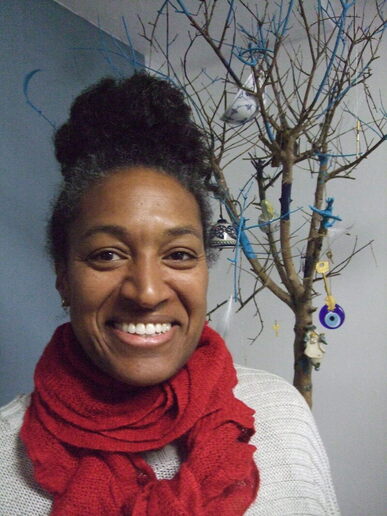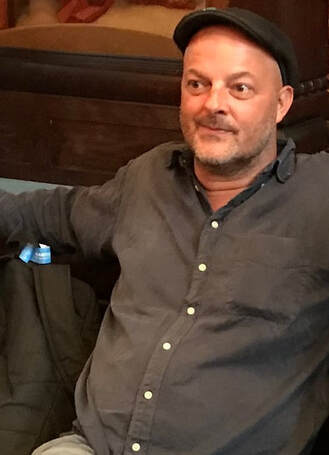Mød Nicol Savinetti & Mads Nygaard til festivalafslutningen til en samtale, der tager udgangspunkt i ude og hjemme. Om at føle sig meget farvet eller meget bleg. Om udlængsel eller om at være en hjemmefødning. Om at være en brun person i en nordisk region. Om forskelle og variationer.
*


Det hele tager udgangspunkt i en tekst som Nicol har skrevet.
Her er et uddrag:
NICOL SAVINETTI: At home with Difference
Skriv noget om,
hvordan det er at være en brun person,
der bor i den nordlige region!
(… write something about, how it is to be a person of colour living in the Nordic region).
Her er et uddrag af, hvad jeg skrev tilbage i 2008, hvor der ikke var så mange brune personer, der søgte ind på de finske universiteter, hvor jeg endte med at skrive min PhD om privilegeret udvandring.
*
The question
Where are you from? is not a simple one for people like me to answer: born in
England, a different skin colour, living in Denmark and studying in Finland. I
no longer have an instinctive response, but rather a process of thoughts: my
immediate thought is What difference do they want to know about? In mathematics
the concept of difference is clear: the difference between eleven and seventeen
is six. If only difference among human beings were so easily understood and,
more importantly, accepted. In coming up with my answer there are three further
steps in my thought process: First of all I consider the country we are located
in when the question is asked. Then I make an evaluation and conclusion (be it
right or wrong) as to whether the person is asking where I was born, where I
grew up, where I live, or what my ethnic origins are. Finally I respond with an
answer to one of the aforementioned, often qualified by an answer to one or two
of the others. This must sound like a drawn out process, but I have been doing
it for many years now so it is pretty much second nature to me. If the question
is being asked by someone who is English, they are usually asking about where I
grew up; then my response is born in London, grew up in Essex (and live in Copenhagen).
This is usually followed up with banter about Essex girls (in the rest of
Europe, the jokes are often about blonde girls) and my ‘hometown’
Southend-on-Sea. Brits are usually quite direct if they want to know about my
cultural heritage or skin colour and simply ask where my parents are from.
Finns, when they ask where I am from, are usually asking what country I have
come from, i.e. where I live, so I respond with live in Copenhagen and am from
England. I love the Finns for their need-to-know basis for conversation. I have
good friends who have never asked me where my parents are from. When I lived in
Germany, the experience was similar to that of Finland: my heritage was not a
common topic of conversation. Danes are a little tricky: most want to know
about my skin colour, but many want to know what part of England (or even the
US) I am from. So, in Denmark I usually respond with from Essex in England and
then I wait for them to ask about my skin colour if that is their interest. At
some point early on in the ensuing discussion I usually also have to mention
that I have not lived in England full-time for about 12 years as many people
start referring to TV programs and other decidedly British stuff. When I was in
Australia I responded with from Essex in England and was often confronted with
“No, where are you really from?” which made me laugh at first and then
horrified me when I would reply that my parents are Jamaican and the proceeding
conversation would be about reggae music, Bob Marley and the sun, sea and sand
of the Caribbean, which I have only visited twice for a total of 4 weeks. What
is even more horrifying is that I have similar conversations with highly
educated and welltravelled people in Denmark as well. This conversation was
more of a surprise to me in Denmark because I couldn’t understand how people
could be so uninformed in Western Europe, a relatively small area of land with
a multitude of diverse cultures, languages and histories where the vast
majority of people have good access to education, media and travel. I cannot
say so much about my Finnish experiences because I do not speak Finnish and am
only ever in academic environments when I am there. But, I can say that I have
never had that conversation.
Different
perspectives
Having lived
here in Copenhagen now for almost a decade, I realize that many Danes have such
an enormous sense of pride and strong affiliation to their national identity
that it may be difficult to comprehend that not everyone is as patriotic or
nationalistic, and that we don’t actually need to be. Here, it is almost
expected that I express the same feelings of affiliation to a place, be it
Jamaica or England (but not Denmark) no matter how long I have lived here for,
which leads us to another common question: “So, do you think you are going to
stay here?” Imagine being asked that question every single time you meet a new
person – that is the reality of being foreign in Copenhagen.
In the Danish
media when an incident occurs involving someone with an ethnic background that
is not 100% Danish, they are commonly referred to as having a ‘foreign’
appearance (a Danish synonym for different colour skin). The use of the word
‘incident’ is intentional - when it is an ‘event’ that difference is barely
given a mention. As has been well advertised in recent years, Danes are some of
‘the happiest people in the world’. I nickname the World Happiness Survey the
Nothing to Complain About Survey, as if you have ever lived in Denmark you
would know that on a day-to-day basis, Danes are not considered to be the
happiest bunch by foreigners who live here. They do on the other hand have the
capacity when speaking to foreigners and journalists to be proud of, and fully
appreciate, the fact that they are fortunate to have more opportunities open to
them than most people in the world and live in a relatively safe, secure,
well-functioning environment. Life as a foreigner is a different story: the
windows of opportunity are few compared to many other European countries, but
the attraction is that the lower level of that window is very high. High basic
incomes, good welfare and social provisions, good access to education, more
sense of equality between the sexes and a moderate climate altogether make for
an attractive place to stay, in spite of the racial insensitivity and tension.
Being
different
All said and
done, I absolutely love being a foreigner. I always have been one and I always
will be wherever I live or travel. I was fortunate to be a middle child and
that my parents gave me the start in life that allowed me to explore people and
places with a calm, inner confidence about who I am and what I represent. It
may simply be for that reason that I have not ever regarded difference as
negative or something to be afraid of. Being a foreigner in Scandinavia is not
much different from being a foreigner anywhere else in these times; the
challenges simply change depending on the location. Being a woman here on the
other hand is something special and totally unique to Scandinavia.
*
Mød Nicol og Mads til festivalafslutningen,











